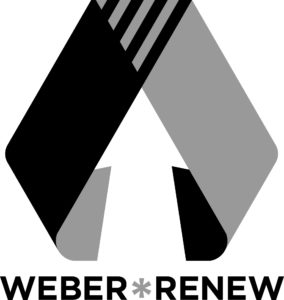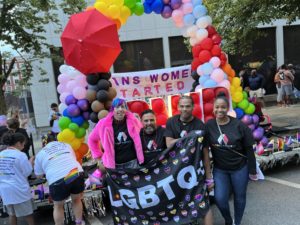Project Weber/RENEW is Rhode Island’s center for harm reduction and recovery services. While providing peer-led harm reduction and recovery support services and programming, PWR builds relationships with the people they serve and fight for systemic change. PWR empowers people of all orientations and gender identities who engage in drug use and/or sex work to make healthier and safer choices in their own lives.


Among the services PWR provides at their drop-in centers and via street outreach are:
- Safe-use supplies.
- Access to naloxone and training on how to use it.
- Safer sex supplies.
- HIV/HCV testing and linkage to treatment.
- Peer-led case management services.
- Linkage to recovery programs.
- Sober housing.
- Detox transport.
- Access to basic needs and hygiene supplies.
PWR believes that all people deserve a loving space free from judgment and that everyone has the power to change. In 2021, the organization served 4,600 unique individuals across 12,500+ encounters. They have locations in South Providence, Kennedy Plaza (daily van outreach), 6th District Court (Providence), and Pawtucket.
Read our conversation with PWR:
What got you involved in harm reduction? How did your organization get founded?
Project Weber/RENEW began as two separate Rhode Island organizations, both providing peer support, community and tools for people in our state who use drugs, engage in sex work or are unhoused, and people living at the intersections of these experiences. Project Weber started in Providence in 2008 as the only organization in the U.S. exclusively serving men who engage in sex work.
Project RENEW began in 2006, serving women who engage in sex work in Pawtucket and Central Falls. The organizations merged in 2016, with a new program specifically serving and uplifting the trans, gender-diverse and non-binary community. Having grown and changed over the years, PWR continues to center peer-led support and meeting people where they are at.
We believe that all people deserve a loving space free from judgment and that everyone has the power to change.
What is the most important thing that people should know about your work?
We see many organizations that are either recovery or harm reduction organizations. We pride ourselves on being an organization that recognizes and celebrates that harm reduction and recovery are part of the same continuum.
We are proud to be a hybrid organization where someone can access either harm reduction or recovery supports, and there is no judgment or stigma for people choosing to access any services.
What specific populations do you work with at your SSP? How do you tailor your programming to these populations and their needs?
One of the things that defines us at PWR is that we say that anyone walking through the doors will see a staffer (or staffers) who reflect their identity, their recovery journey or their experiences.
Both our staff and clients range in age from 18 to their 60s or 70s. The majority of our staff are LGBTQ. The majority are BIPOC. Many are former sex workers, several are HIV positive, and staff represent a huge range of recovery pathways.
We have specific support groups and project serving specific populations, including male sex workers, trans and gender-diverse individuals and women involved in sex work, but we serve a wide ranging population and never turn anyone away who walks through our doors.
We have seen the ways in which SSPs and community-based harm reduction programs have adapted services in response to the ongoing COVID-19 pandemic. Could you speak to some of the innovative programming you’ve done?
Especially in the early portion of the COVID-19 pandemic, we were one of the few organizations in Rhode Island to continue our outreach and harm reduction work in-person despite the risk to our staff. This was a staff decision to continue, even at the height of COVID. Because we were one of the few organizations to continue in-person services, particularly outreach, we had to shift to provide considerable basic needs to people we serve.
We were consistently coming across hungry people whose food pantry options had closed, or who had missed the small window at the soup kitchen. This, along with the realization that many people relied on our needles and Narcan to survive, led us to continue serving throughout the entire pandemic despite considerable risk to our staff — many of whom are immunocompromised themselves — but who wanted to continue to serve, knowing the critical nature of these services and materials.
We have also started several COVID-specific programs, including distributing COVID masks and cleaning supplies, hosting vaccination clinics and sharing educational information about COVID and vaccines.
What has worked for you all during the age of COVID-19? What hasn’t worked?
Continuing to remain person-centered has worked very well in the age of COVID. We have seen clearly that cookie cutter solutions did not work before COVID, and they work even less well now. We have remained adaptive, creative and continually adjust our services and interventions to meet the needs of those we serve.
However, all of that adjustment took time, communication and resources. Because our staff are peers, there is a high level of understanding and empathy for people who, for example, may be hesitant to trust the medical system. Our staffers do not judge someone who is hesitant to get a vaccine but rather listen, talk to people about their own fears and give them accurate health information.
In addition to the COVID-19 pandemic, we have continued to see record numbers of people die from overdose and an increase in the number of people experiencing homelessness. Working at that intersection has been incredibly challenging.
Who makes your work possible? In what ways does this happen?
Our work is only made possible by the incredibly hard work of our staff, as well as the support of partners. Our peer staff sacrifice their time, energy, blood, sweat and tears to ensure that people get what they need despite working within incredibly broken systems.
We also have community partners who work within the same person-centered model that we believe in. We are grateful to have the support of many key stakeholders in Rhode Island. We are also grateful that people have been fighting for harm reduction measures for decades in our state — and that so many people are working across the world for drug user health programs, funding, laws and support.
We also have generous donors — from funders who lead with a trust-based model to individual donors whose contributions allow us to purchase things that traditional funders may not, including specific case management and client support supplies.
What enrages you when doing this work?
The pressure on harm reduction organizations, particularly peer-based ones, to compensate for failures of larger systems that we have little control over. But because we know that if we do not continue, people will die, we keep pushing on despite outrageously high demand for services, limited options for long term medical and behavioral health placements and care for people, and lack of investment in housing, basic needs and economic supports for a population that needs all of the above.
What motivates you?
Seeing people go from clients to new staffers, to learning how to be an advocate, to becoming a leader in the community and using their voices to change our state and our world, is enormously motivating.
Seeing people we serve come in and say that “this is the only place where people don’t judge me” or “you all are the only people who get it” motivates us every day.
Hearing people whose lives have been saved by the Narcan that we distribute gain a day or a week or a year in recovery and celebrate that with our staff is incredibly powerful.
Follow along with the AIDS United blog as we feature the work of more of our harm reduction grantee partners in the community every day.
For more information about AIDS United’s harm reduction work, visit our website: https://aidsunited.org/our-initiatives/harm-reduction/.
To connect with Face to Face, visit the organization on social media: Facebook, Twitter and Instagram.

